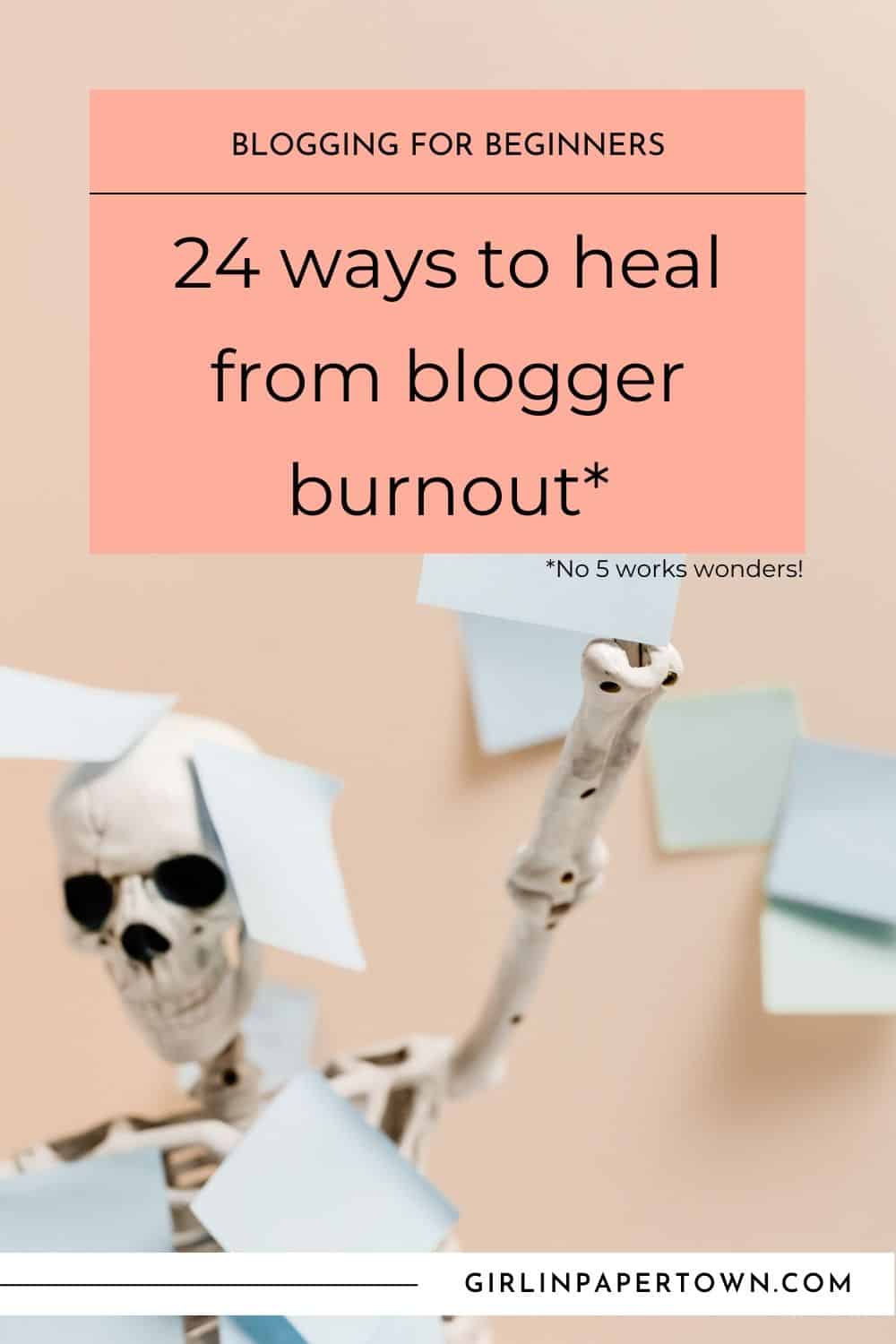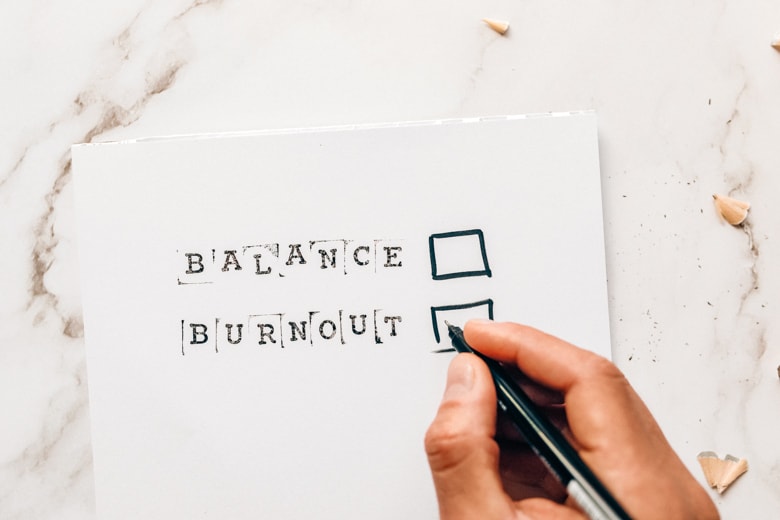Blogger Burnout: Why It Happens and How to Prevent It (Based On My Experience)
Some of the links in this post are affiliate links which means I earn a small commission if you purchase or book through my link, at no extra cost to you.
Since the beginning of 2022, I published a new blog post almost every week. Between July and September, I haven’t missed a week and for the first time in ages I was finally on track to hit my goal of publishing 52 posts in a year. I’ve created a content master list that contains over 300 blog post ideas and slowly wrote more and more, hoping to create enough content to publish twice a week. Then October arrived, and instead of increasing the frequency of new blog posts being published, I disappeared once again.
I got hit with blogger burnout once again.
Navigate to where you want to go:
Reason why I disappeared again
If I remember correctly, it’s the third time I disappeared from my blog with no notice. I’ve always been very serious with blogging and tried to stick to my schedule as closely as possible.
I kept publishing new content even when I didn’t believe in myself and what I was doing.
I spent evenings writing, editing, and researching new posts.
I didn’t take any breaks because I wanted to publish regularly even though writing took me longer that it was supposed to.
FYI, what I mean by that is spending more than 13 hours to draft one post. A few months ago, I tried to track time I spent on creating one post from the keyword research to hitting publish and it averaged anywhere between 15-20 hours.
At first, I wanted to take a two-week break from blogging so I could move house without stressing out about writing and missing deadlines.
Two weeks turned into three. Then, four.
Every time I tried to write something, I got nothing.
I stopped feeling passionate about blogging.
None of the ideas seemed good enough to write about.
I started doubting myself again.
When I looked at my analytics and saw that blue line going down and down, I got even more discouraged. Analysing it didn’t help. Even though decline in page views wasn’t surprising, seeing as content that brings most of the traffic is heavily travel-related. Who’d like to travel when it’s pouring rain outside?
I wouldn’t.
So I continued looking at statistics and doing nothing blog-related.
Stress and anxiety brought by unresolved house moving issues didn’t let me focus on blogging and digging deeper to discover the issue that really troubled me.
I ended October thinking that I might just delete this blog altogether and starting a new one, in my native language, with a different type of content.
Then, November came.
I realised that although it could be interesting to start a new blog; I have no reasons to delete this one. Sure, some articles didn’t turn out as well as I wanted them too, but I worked hard on them. They aren’t worthless.
Drafting a couple of posts in Polish showed me how uncomfortable I felt writing in my native language, and to my surprise, I longed to write in English. At some point, I got a new secret Instagram account where I was publishing posts every day, and it made me feel good but… it also showed me I don’t want to hide anymore just because I’m afraid of what others may say.
Getting diagnosed with depression and severe anxiety topped it all up.
I needed a break.
I needed to stop worrying about writing, worsening statistics, and everything related to it.
I was done.
Things that caused burnout
There are a lot of things that contributed to me getting blogger burnout. Lack of days off, overwhelm caused by social media, overthinking, impostor syndrome, no specific goal or vision, comparing with others, worrying about what other people might think… The list goes on and on. It didn’t happen overnight but was rather an end effect of a long-lasting neglect and lack of organisation.
I feel bad admitting it, though.
What is burnout
Burnout is a state of emotional, physical, and mental exhaustion caused by excessive and prolonged stress. When you don’t take care of yourself, don’t know what and why you’re doing, struggle with staying on top of your tasks, or not knowing what those tasks are supposed to look like, you’re on a slippery slope heading straight into a state of burnout. But don’t worry! There’s a light at the end of the tunnel.
How I deal with it
Journal
If you’ve scrolled through my blog, you shouldn’t be surprised by the fact that journaling is the first thing I mention here. I started doing it every evening just to get a break from having a constantly cluttered mind. I’ve had a million thoughts running through my head all the time and I couldn’t calm it. By writing them down, I could go through them and categorise them. It also helped me to recognise and deal with my emotions. That’s how I realised I experienced something worse than blogger burnout – a depression.
Allowing thoughts to pour on the paper and work through them one by one is a great way of listening to yourself and making sure that all that mess doesn’t stay in your head for long.
RELATED:
30 Easy Journaling Ideas For Beginners (+ PDF Printable Journal Prompts!)
Find reasons why you got burned out in the first place
This one goes hand to hand with journaling. To combat blogger burnout, find reasons you feel this way.
Dig deep and get to the bottom of it.
Once you know what the cause is, you can combat it and prevent from happening again.
For example, if you’re burned out because you’ve worked 24/7 with no breaks and days off, schedule time for rest. Sometimes simple actions help the most.
Remember, that’s easier to prevent than to cure.
Limit social media
Have you ever went to social media when you felt down or tired? Did it make you feel better? I bet the answer is negative. Social media, even though gives an impression that it gives us a break and allows to relax, in reality it does the exact opposite.
I spent hours on social media in the last couple of weeks. I was on top of all the stories, posts, and reels that got published.
At first, I felt better because it distracted me from my thoughts and feelings. It didn’t last long, though.
I quickly started comparing myself to others and spiralling into negative thoughts. I felt like a failure. I was supposed to publish one blog post a week, after all. Not a big deal. But I didn’t manage even that. How was I supposed to make a living out of it?
RELATED:
What Failed Social Media Detox Taught Me: Setting Social Media Boundaries Is Important
When I noticed how badly I was feeling, I limited time spent on social media immediately. I stopped watching all the stories. Instead of scrolling mindlessly through Instagram, I made a new account when I started posting very personal stories using a fake name. Switching from just consuming content to creating it with no expectations helped me switch focus and change the way I was using the app, feeling no signs of withdrawal.
I’ve heard recently that we limit screen time for our kids, yet we put no limit on ourselves. And that’s true! Spending hours staring at the screens isn’t healthy for anyone.
Turn off notifications
Notifications are a real pain in the butt, aren’t they? Every time you get one, you feel bound to take out your phone and check what’s going on.
Is it a message you’ve been waiting for hours to receive?
Nope, that’s your favourite game, saying that you haven’t logged on in two hours.
Be mindful of what notifications you allow to ping you during the day. It’s important to make sure that your locked screen isn’t cluttered with useless info and your phone doesn’t light up every minute or two. It will boost your productivity and ability to focus immensely, trust me.
Take a blogging break
That’s pretty self explanatory, isn’t it? Taking a blogging break was the most freeing thing I’ve done in a very long time. I never intended it to last two months, but it looks like it was something I really needed. I’m grateful for the opportunity to move house in the meantime, because it helped me to stop thinking about writing and focus on a completely different task.
If you have blogger burnout and you feel like you could use a break, take it. Don’t stress about missing deadlines (unless they’re set by someone else than you!), hide your laptop or whatever tools you use for writing, and stop thinking about all the stuff you “should” do right now. Go outside, try a new hobby, learn something new. The world is your oyster!
PIN FOR LATER!

Get outside
Every time I don’t know what to do, I go outside. That’s why it was so important to me to rent a house with an outdoor space. Going for a walk is freeing and helps to clear my mind immensely, but sometimes I’m too stressed out to deal with the entire ordeal required to leave the house with a toddler. Even five minutes in the garden with a cup of warm tea boosts my mood and helps me recenter.
Remind yourself of your definition of success, live vision, and goals
This is one of the main reasons that made me feel burned out. Truly.
If you don’t know where you’re going or what your end destination looks like, it’s hard to stay motivated and focused on the work you do. Having a clear goal and understanding what your life vision looks like will help you stay motivated and on track.
Write (about) something else
You know what helped me the most? Writing! Weeks before I experienced blogger burnout, I joined a live creative writing course which unfortunately was due to start in the middle of my “break”. Even though I was very reluctant to get back to writing, I didn’t want to miss out on that opportunity. And you know what?
Writing in a cosy environment made me feel safe. Other participants pushed me to write a completely different story that ones I’ve been creating so far, which reminded me how much I love writing and helped me get back to it.
That story turned into a NaNoWriMo project which I gave up on after writing 4,000 words, but I still consider it as a small win. One day I’ll come back to it and who knows, maybe this will be my bestseller I’ve been dreaming about for years?
This, and lots of positive feedback I received during the writing course, helped me get back to blogging.
Plan your day
I’ve noticed that whenever I create a task list for the day, I’m more motivated and productive. Usually, I like to do that evening before, so I have fewer things to worry about after I wake up in the morning.
Finding a right planning system for yourself can take some time, but it’s really important. Without it, you’ll have troubles to stay consistent and organised, so experiment until you find something that works for you.
RELATED:
10 Simple Things To Do To Be Productive When You Don’t Feel Like It
Get ideas down on paper
Even though I mentioned plenty of times that I prefer digital note taking that paper one, I have to admit, that’s not always true. I love the feeling of writing with a pen on a paper which is also special somehow. Getting all thoughts and ideas down on paper helped me big times when I was brainstorming which direction I should go now and what I need to focus on. It was way more helpful than writing on an iPad.
How to prevent blogger burnout from happening again?
Take breaks and days off
I can’t stress enough how important it is to have some time off. I know how it feels when you’re running behind and trying to catch up – I’ve done it more times than I can count. My attempts were rarely successful, though.
When you sacrifice your time off and use that time to catch up on your work, you end up being less productive and more stressed out. You’re not a machine and can’t work 24/7, trust me. I learnt that the hard way, unfortunately.
Remember to schedule in some time to rest during the week, as well as to leave at least one day off. It doesn’t matter whether you choose to be off the entire weekend, only on Sunday, or in the middle of the week – do whatever works best for you.
When you plan your day, set some time off in the middle of a day for a lunch break. This way, you’ll have some time to recharge and be more energized during the second part of your day.
Be realistic about what you can do in one day
It’s so easy to over-schedule your day. When you plan your week or day, be realistic about how much time each task takes you to do, as well as how many things you can do.
Every task takes some mental energy to complete. Imagine that when you wake up in the morning, you get 100 tokens to use for whatever you want. Each task cost set amount of tokens, e.g. taking a shower might cost 5 of them, drafting a blog post 35, and cooking dinner 20. If you stay up late the day before, each task might become more expensive. Getting a full night of restful sleep makes a task cheaper.
Taking a break in the middle of the day, sprinkling small acts of self care throughout the day “recharge” you a bit.
So if you spend your day working on mentally heavy tasks, you won’t have much energy left for going to the gym or meeting with friends in the evening. It also means that you won’t be able to be productive throughout the entire day. One or two big tasks will drain you out of energy and you won’t have enough “tokens” left for the rest of the tasks.
TLDR; you need to be smart when planning your day and be mindful of your energy levels. Don’t schedule too many tasks and don’t put more than one or two big things for the day.
Remember your why
Have you ever thought about why you write a blog? What’s the reason behind you sitting all day long and typing on the keyboard? If you do, that’s great! If not, take a bit of time, sit down with a piece of paper and reflect on it.
What’s your “why”?
What’s the force that drives you?
What’s your mission and purpose?
Every time you doubt yourself, have no motivation, and feel like giving up, remember your “why”. Remind yourself about it as often as you need to and keep going!
Regular admin day
There’s nothing worse than hundreds of unread emails and bookkeeping that you’ve neglected for months. It stays on your mind without you noticing it and adds another layer of stress unknowingly. In other words, it’s an unnecessarily created “open loop“.
It took me a long time to realise that keeping my inbox empty makes me more focused and calm throughout the day. I’d love to say that I’m as good with my bookkeeping as I’m with my emails, but that’s not true at all. I struggle with it big times, but as I don’t have too many receipts to deal with, it’s fine. For now.
Have fun
When was the last time you had fun? Like fun fun?
It seems silly to have fun when you’re an adult, but life gets really boring without it. Going to a trampoline or amusement park, taking part in an art class or learning how to dance can be great for creating new memories, having fun, and taking a break from daily life and your responsibilities.
Outsource and automate
Oxford Dictionary clearly says that burnout means to become extremely tired or sick by working too hard over a period of time. And what’s the easiest way to work less? Automate and delegate as many tasks as you can!
I know. It’s easier said than done.
You might believe that you’re the only person who can do all those tasks. You might also feel you should be self-sufficient and deal with everything on your own. Blogging isn’t so hard after all! Or is it?
One thing that often comes with blogging is feeling like it’s not a proper work. It makes it so much more difficult to outsource any of your tasks. There’s nothing wrong with getting a manager, editor, photographer, or whoever else you might need to help you.
That saying, I’m not in a position to really give you a lecture about hiring other people. I’m doing everything on my own, but I can see where I could use some help. I strongly believe that it could be helpful in making sure that you won’t experience blogger burnout again.
Automating is a completely different story, though.
If you’re comfortable with it, you can use AI software to help you generate content. Some bloggers say that text-to-speech recognition helps to create content even three times faster than by typing it.
Using software like Grammarly or ProWritingAid to check your grammar, punctuation, and other stuff like can also make your job easier.
Schedule all your content ahead of time, for example, once a week. This way, you won’t have to remember about doing it manually when the time comes.
Use a plug-in to optimise images when you upload them to WordPress.
Simplify and write down your content creation workflow so that you can spend less time thinking about what’s the next step you need to take every time you sit down to work.
There are a lot of other things you can do to automatise your workflow and I can create a separate blog post about it. Just let me know in the comments down below or message me on Instagram saying that’s something you’d be interested in!

Set goals
When I think about setting goals, I immediately have New Year’s resolutions pop into my mind. It might be the reason I’m so reluctant to create them!
Without knowing what your goals are, though, you have no destination, no reason to pursue blogging or other things you’re doing. How can you be motivated and willing to put time (and money, possibly) into something when you don’t know what is it for?
Once you set your goals, make sure that they have a deadline, they’re realistic, and you have a way of tracking your progress. Make them visible so you’ll be constantly reminded about them and remember what you’re going after.
Don’t compare yourself to others
Comparison is a true theft of joy. For a very long time, I haven’t even noticed that I’ve been comparing myself to others constantly. I’m not exaggerating here – I’ve been doing it all the time.
Each visit to Instagram ended up with me feeling bad about myself. Every YouTube video left me being jealous of other’s “perfect” life, beautiful homes, and amount of money they have. I know, I sound terrible now.
I focused so hard on feeling bad about myself that I forgot that everyone’s path to success is different. Comparing myself to others didn’t lead me anywhere good, but chasing my dreams and pursuing my goals did. And that’s what matters.
Instead of comparing yourself to others, compare yourself to the past version of you. Remind yourself where you were 6 or 12 months ago. How much have you achieved during that time? How many good things have happened since then? I bet you made so much progress without even realising it!
Post less often
One of the most common advice for new bloggers is to post regularly and often. You know, the more blog posts you publish, the bigger’s chance to get found, hit first page in Google search, that kind of stuff… And that’s true! BUT you need to remember that quality is more important than quantity and sometimes less is more.
Even if you’re like me, and want to publish one or two new blog posts a week, but you feel like it’s too much for you at the moment, change frequency to bi-weekly. It doesn’t have to be permanent! Cut yourself some slack and focus on what’s really matter long term – posting less often will probably have better results than getting burned out and disappearing for two months, like I did.
All of that in the name of “posting weekly isn’t often enough, but I can’t keep up and won’t give it up either”.
It took me almost two years to get to the point when I feel confident that I can keep up with posting twice a week. Without hours spent on journaling and brainstorming ideas I wouldn’t be where I am right now, though. It’s not like I have more time to write now – I just realised what I want to write about and created sustainable habits that help me stay on track.
Be patient
Rome wasn’t built in one day.
In normal scenario, you won’t get recognised after a month or two of blogging.
You won’t earn thousands of dollars from the day one.
It’s likely that you won’t earn anything in a year or two.
Be patient.
Take small, sustainable steps and continue to grow following your own timeline and chasing your own dreams. Don’t forget what your life vision and goals are, and don’t rely on random bursts of energy. Waiting for motivation will lead you to nowhere.
Re-evaluate your reasons for blogging
Have you ever truly asked yourself why you’ve started blogging at all? What’s your reason behind it?
I bet you did.
Take your old notes and go through them. There’s a huge chance that your reasons have changed somewhere along the way and they’re no longer valid. Re-evaluate your reasons for blogging, why you’re doing what you’re doing, and what you want to gain from that.
Don’t forget to put that list in a visible or easily accessible place. Go through it regularly, like monthly or quarterly during your check-in meeting, for example, and update it when your circumstances change.
Learn how to say “no” and set boundaries
It’s hard for me to say “no”. If someone asks me to do something, it’s likely that I drop everything I do and go help them. But, at the end of the day, when I see how little I’ve done to pursue my own goals, I get stressed out and overwhelmed. It’s a slippery slope to heading towards burnout.
Setting boundaries it’s important for your mental health. They’re here to protect your peace and make sure you won’t feel depleted of energy or taken advantage of. Healthy boundaries are also a part of self-care and lack of them has a detrimental effect not only on your health and the way you feel but also on your work performance and relationships.
Take care of yourself
It’s very easy to forget about it when you’re in a busy season of your life. Spending time on self-care seems like a waste of time, because you could do so many productive things instead. The truth is, though, that self-care is important and you won’t be as efficient as you could be without it.
Look into the habits you’ve built over time. Do you scroll Instagram every time you have a bit of time for yourself? What about spending this time on journaling, meditating, or reading instead? You can easily sprinkle some small self-care acts throughout your day.
Create a plan, schedule, and routines
I’ve noticed that I’m more productive every time I create a to-do list for myself. This way I know what I’m working on today and I don’t waste too much time. Have you heard that failing to plan is planning to fail? There’s something in it.
If you set your goals and then plan your way to them, you set yourself for success. Having a clear mind about how you want to accomplish your goals is a vital way of making sure that you’re on track. Knowing what you’re working towards and setting up schedules and routines that support your vision will help you avoid getting burnt out and to make sure that you have enough time to rewind and take care of yourself every day.
A simple plan of action prepared ahead of time limits the amount of decisions you need to take in the morning and takes off the layer of stress of not being sure what your next step is.
RELATED:
What To Do When Your Plan Fails? Follow This 3 Simple Steps To Fix It.
How can you burnout proof your blog?
Have a couple of blog posts ready for an emergency
Best way to burnout proof your blog? Have a few posts ready-made, just waiting in your WordPress to be posted. It’s easy to say, I know. I’m still trying to accomplish that. One thing that helps me write more and stay a little ahead of the game is a habit of writing daily. As with every habit, it’s difficult to start and keep going when you’re not used to doing that, but it’s very rewarding.
Ask someone to write a guest post
If you’re in a position of having someone willing to write a guest post, take it. You can also ask someone to write a guest post and keep it ready in WordPress just so you can publish it whenever you need a break. It can be also helpful to have such post schedule every couple of weeks so you can build your own bank of blog posts ready to be published in the future or when you don’t feel well.
Write about your experience
That’s what I’m doing right now! Just write about your experience and what you do to improve your situation. People like things they can relate to. I love reading more personal posts showing the real person behind them that has struggles similar to mine. Content like that is inspirational and motivational to read for others. I know that from my experience.
Final words on blogger burnout
Blogger burnout happens to the best of people. You don’t even have to be a blogger or content creator to experience a burnout. But there’s a light at the end of the tunnel and if you take care of yourself and pay attention to what you feel and why, you’ll find the way out, too.
It’s not the first time that burnout hit me, and it’s probably not the last one. Each one of them was different but caused by similar things – not knowing where I’m going, stressing out about my journey and the way I do things, being afraid of negative comments, being unable to plan and make goals.
Now I know that some of those things were caused by depression and anxiety too, but just so you know, that’s not the end of the world. You can do it. You can push through it. Ask for help if you think you need it. There’s nothing wrong with that. Trust me, been there, done that.
Have you ever experienced a blogger burnout? Or any type of burnout if you’re not blogging? How did you deal with that? Let me know in the comments section down below!




